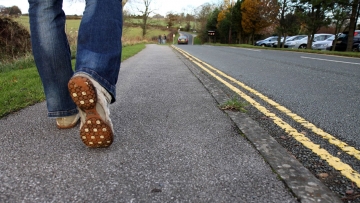Coping
Chronic pain rehabilitation programs are a traditional and effective treatment for chronic pain. Such programs are based on cognitive-behavioral principles that aim to change how you experience pain. By doing so, chronic pain rehabilitation programs help you to a) reduce pain and b) return to meaningful life activities even though some level of pain may persist. In other words, by participating in chronic pain rehabilitation, you change your relationship to chronic pain. You no longer perceive pain as an alarming and disabling condition, but develop the know-how to understand your pain as a benign condition that no longer needs to disrupt or prevent your daily life activities.
Wouldn’t it be good to become so competent at dealing with persistent pain that you no longer are disabled by it?
Reducing Pain Talk: Coping with Pain Series
A common complaint among people with chronic pain is that their pain has come to occupy too much of everyone’s time, attention or energy. In other words, it can sometimes feel like their pain is the only thing anyone ever talks to them about – that they’ve become almost synonymous with their pain.
We call it pain talk. Pain talk is the persistent verbal focus of everyone’s attention on the pain of someone with persistent pain.
One of the more long-standing recommendations of chronic pain rehabilitation is to reduce pain behaviors. It’s one of the ways that people with persistent pain can learn to cope better with pain. Let’s review how to do it.
Exercise, of course, is good for you. Activity is good for you too. Both are helpful for those with chronic pain. Yet, they are different. They are not an equal substitute for the other. Let’s explain.
The Institute for Chronic Pain is an educational and public policy think tank that produces academic quality information on chronic pain. We aim to provide such information in a manner that’s empirically accurate, yet also approachable to patients, their families, non-specialist healthcare providers, third party payers, and public policy analysts. We do so because the field of chronic pain management needs to change.
It's cold and flu season again and we all do the best we can to stay well and avoid catching an all-too-contagious virus. We each have our own go-to plans of how to fight it: vitamin C, zinc or elderberry supplements, gargling with salt water, staying warm, rest and binge-watching Netflix shows. My grandmother swore by anise candy that she made from scratch, while my father prefers a hot toddy to remedy a cold. Washing hands is still the number one way to avoid illness -- along with avoiding contact with your face, and keeping your immune system strong.
6. Spend More Time with Loved Ones; 7. Travel; 8. Live More Independently; 9. Enjoy Life More; 10. Be in a Better Mood
1. Everything; 2. More of What I Am Already Doing; 3. Clean My House; 4. Get Back to Work; 5. Exercise
In the last post, we began to introduce a broad definition of coping, as one’s subjective experience, or reaction, to a problem. In this post, let’s expand on this definition and explain how coming to cope better with a problem is a process of coming to experience the problem in a different and better way.
A major tenet of chronic pain rehabilitation is that the way you experience pain is not the only possible way to experience pain. In other words, the experience of pain differs across individuals and can even differ in the same individual across time. As such, it's possible to have a different experience of pain than the experience that you have today, even if your pain remains on a chronic course.
From the time before Socrates in ancient Greece there stood a temple built upon a spring at a location the Greeks would have considered the center of the world. They called the temple, "Delphi". Inscribed on the walls of this holy temple was the simple phrase, “Know Thyself”.
Coping-based healthcare is often misunderstood in society and, as a result, it is commonly neglected by healthcare providers and patients alike. Examples of such care are chronic pain rehabilitation for pain disorders, cardiac rehabilitation for heart disease, psychotherapy for mental health disorders, or diabetic education for diabetes. These therapies are often the last thing that healthcare providers recommend or the last thing people are willing to try, even though they are typically some of the most effective treatments for their respective conditions.












